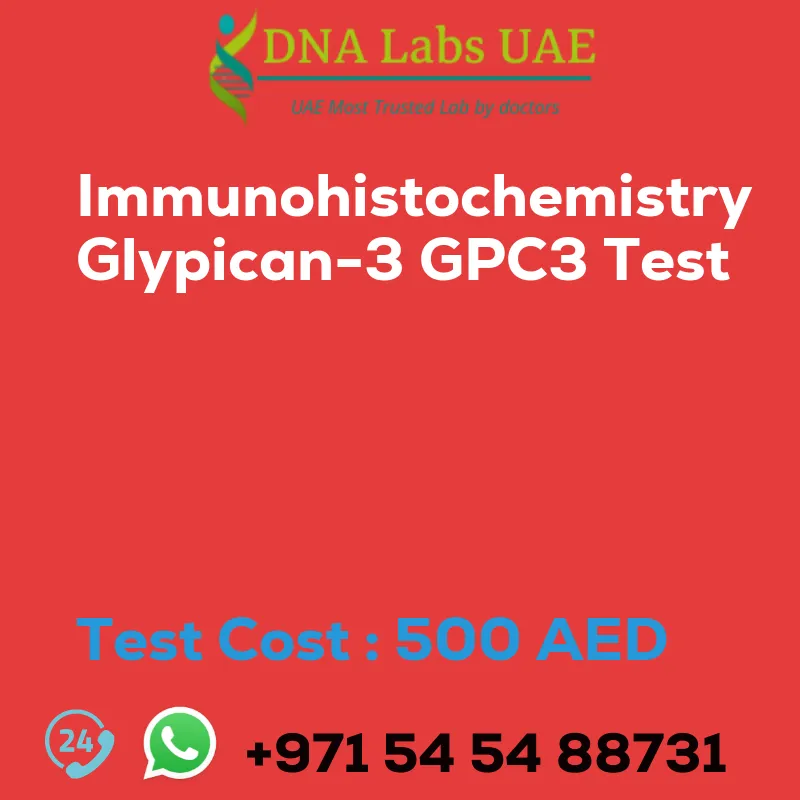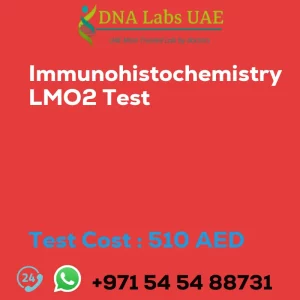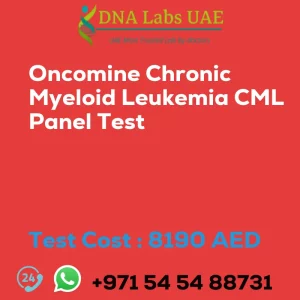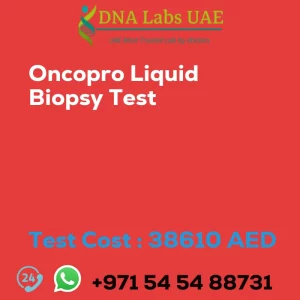IMMUNOHISTOCHEMISTRY GLYPICAN-3 GPC3 Test
Cost: 500.0 AED
Symptoms, Diagnosis, and Test Details
The immunohistochemistry (IHC) GPC3 test is a diagnostic test used to detect the presence of the glypican-3 protein in tissue samples. Glypican-3 is a cell surface protein that is normally found during fetal development but is absent in most adult tissues. However, it is overexpressed in certain types of cancers, particularly hepatocellular carcinoma (HCC), a type of liver cancer.
The GPC3 IHC test involves staining tissue sections with an antibody specific to glypican-3. If glypican-3 is present in the tissue sample, it will bind to the antibody, allowing for visualization and detection. The test can be performed on biopsy samples or surgical specimens obtained from patients suspected to have HCC or other cancers associated with glypican-3 expression.
The results of the GPC3 IHC test can provide valuable information for the diagnosis and classification of tumors. A positive result indicates the presence of glypican-3 in the tissue sample, suggesting the likelihood of HCC or another glypican-3-positive cancer. Conversely, a negative result suggests the absence of glypican-3, making HCC less likely.
Test Components and Price
- Components: Immunohistochemistry
- Price: 500.0 AED
Sample Condition and Delivery
Submit tumor tissue in 10% Formal-saline OR Formalin fixed paraffin embedded block. Ship at room temperature. Provide a copy of the Histopathology report, Site of biopsy and Clinical history.
Report Delivery:
- Sample: Daily by 6 pm
- Report Block: 5 days
- Tissue Biopsy: 5 days
- Tissue large complex: 7 days
Doctor and Test Department
- Doctor: Oncologist, Pathologist
- Test Department: Pre Test Information
Pre Test Information
Provide a copy of the Histopathology report, Site of biopsy and Clinical history.
Conclusion
The GPC3 IHC test is often used in conjunction with other diagnostic tests and imaging techniques to aid in the accurate diagnosis and management of patients with suspected HCC or other glypican-3-positive cancers. It can also be used to monitor treatment response and disease progression in patients undergoing therapy for these cancers.
| Test Name | IMMUNOHISTOCHEMISTRY GLYPICAN-3 GPC3 Test |
|---|---|
| Components | |
| Price | 500.0 AED |
| Sample Condition | Submit tumor tissue in 10% Formal-saline OR Formalin fixed paraffin embedded block. Ship at room temperature. Provide a copy of the Histopathology report, Site of biopsy and Clinical history. |
| Report Delivery | Sample Daily by 6 pm; Report Block: 5 days Tissue Biopsy: 5 days Tissue large complex : 7 days |
| Method | Immunohistochemistry |
| Test type | Cancer |
| Doctor | Oncologist, Pathologist |
| Test Department: | |
| Pre Test Information | Provide a copy of the Histopathology report, Site of biopsy and Clinical history. |
| Test Details |
The immunohistochemistry (IHC) GPC3 test is a diagnostic test used to detect the presence of the glypican-3 protein in tissue samples. Glypican-3 is a cell surface protein that is normally found during fetal development but is absent in most adult tissues. However, it is overexpressed in certain types of cancers, particularly hepatocellular carcinoma (HCC), a type of liver cancer. The GPC3 IHC test involves staining tissue sections with an antibody specific to glypican-3. If glypican-3 is present in the tissue sample, it will bind to the antibody, allowing for visualization and detection. The test can be performed on biopsy samples or surgical specimens obtained from patients suspected to have HCC or other cancers associated with glypican-3 expression. The results of the GPC3 IHC test can provide valuable information for the diagnosis and classification of tumors. A positive result indicates the presence of glypican-3 in the tissue sample, suggesting the likelihood of HCC or another glypican-3-positive cancer. Conversely, a negative result suggests the absence of glypican-3, making HCC less likely. The GPC3 IHC test is often used in conjunction with other diagnostic tests and imaging techniques to aid in the accurate diagnosis and management of patients with suspected HCC or other glypican-3-positive cancers. It can also be used to monitor treatment response and disease progression in patients undergoing therapy for these cancers. |








